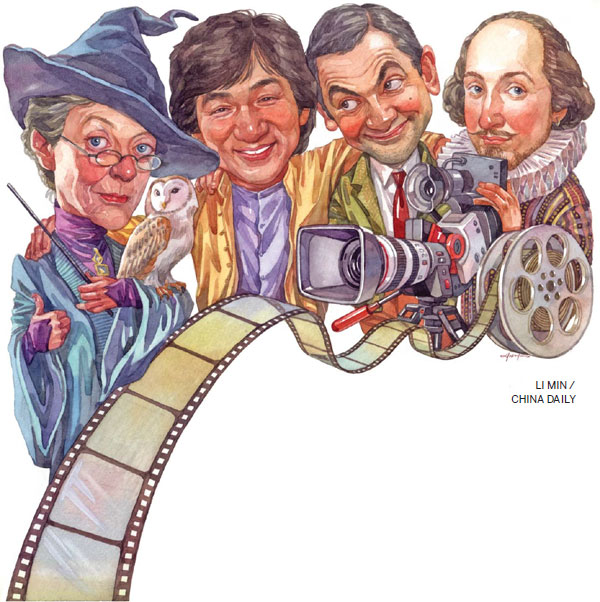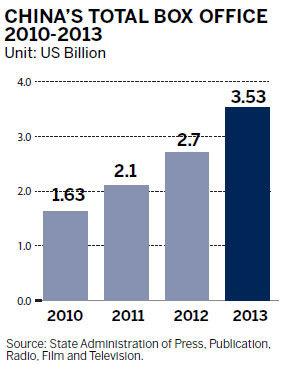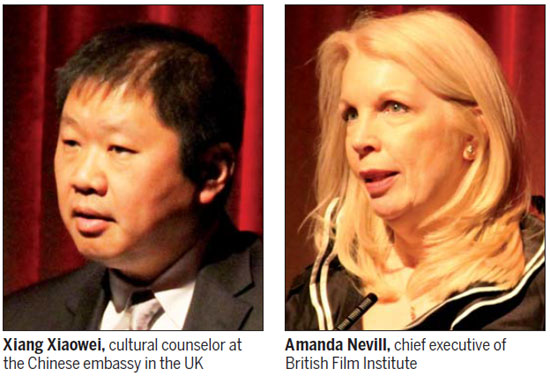Reel Alliance
Updated: 2014-05-30 07:39
By Zhang Chunyan (China Daily Europe)
|
|||||||||||

China, UK plan series of initiatives to enhance cultural ties
Avid movie-buffs cannot forget the famous 1981 movie called Chariots of Fire that chronicles the lives and times of legendary British sprinters Eric Liddell and Harold Abrahams.
Though Liddell won a gold medal for 400 meters at the 1924 Paris Olympic Games, very little is known about his life as a missionary in China afterwards. An upcoming Chinese-UK co-production, promises to shed more light on the flying Scot and his work in the Middle Kingdom.
Gary Kurtz, an Oscar-nominated film producer best known for his work on the original Star Wars trilogy and movies like American Graffiti, says the upcoming co-production project will be a China-centric one and chronicles Lidell's life and death in a Japanese prison camp during World War II.
"We are going to be shooting in various places in China where the events took place. Liddell lived in Tianjin. The neighborhood, the house he lived in and the camp for foreigners are still there. I was there just a couple of months ago," Kurtz says, adding that the Scot is still revered in many parts of China.
"It's a perfect example of how co-productions should be made," Kurtz says. "It has an adventurous Western character that appeals to Western audiences. The movie is set in China and all the main characters except Liddell's family are Chinese. This will make it endearing to Chinese audiences."
In the US, more Hollywood filmmakers are now finding that adding Chinese elements to films is a sure-fire way to increase earnings and box-office appeal in China. Some movies like Iron Man 3, The Karate Kid and Looper have reaped the benefits of having Chinese elements, and the upcoming Transformers movie has upped the ante by filming several fight scenes in China. James Cameron is another Hollywood director who has indicated that he is considering Chinese characters and settings for his Avatar sequels.
Though the buzz and the excitement about China continues, it is countries like the United Kingdom that have taken the concrete steps to forge strong cultural relations with China through a series of initiatives.
Nowhere is it more obvious than in London, where Electric Shadows is one of the most talked about words in entertainment circles these days. Though the name may not ring bells for most UK audiences, it certainly raises eyebrows in China, as it is the name of a popular movie and also the English translation of dian ying, the Chinese name for movies
However, Electric Shadows, is not just a name as it goes beyond the realms of ordinary alliances and seeks to build permanent bonds of friendship between Chinese and British filmmakers.
The first tangible results of the initiative were achieved after China and the UK inked an agreement recently to provide better financing options and easier market access to qualified co-productions from both countries.
Though China and the UK have similar co-production treaties with other countries, the latest agreement assumes significance as it helps British filmmakers to reach out to audiences in the highly regulated Chinese film market.
China's current quota system allows the screening of only 34 foreign movies a year. Foreign production companies are allowed to retain only 25 percent of box office revenue, whereas co-productions are relatively unshackled as they are treated as domestic films.
The lure of the Chinese film market has picked up even as the country's economy has grown. China is now the second-largest film market after the United States, with total box office receipts of around 22 billion yuan ($3.53 billion) last year, far bigger than Britain or India.

From Jan 1 to May 21 this year, box office receipts in the Chinese mainland topped 10.02 billion yuan (about $1.61 billion), with domestic productions accounting for 56 percent of the market, according to statistics provided by the State Administration of Press, Publication, Radio, Film and Television.
It is forecast that China will replace the US as the world's biggest cinema market in the next 10 years, although experts indicate that it could happen much sooner. This is also the reason why more countries are keen on clinching deals with China, experts say.
Amanda Nevill, chief executive of the British Film Institute, says the co-production treaty with China, which has the largest growing film industry in the world, will be of great significance for the UK film industry, as it will pave the way for more collaboration.
"An appreciation of each other's filmmaking culture is the foundation for commercial success ... we are starting to build an even closer collaborative relationship between our two industries to enable them to flourish."
Annual film production revenue in the UK was estimated to be around 1 billion pounds ($1.67 billion; 1.22 billion euros) last year, while British film exports were valued at over 1.7 billion pounds.
"The co-production treaty encourages and makes it easier for various countries to collaborate in a business context. Although the treaty is a government treaty between two countries, it encourages cooperation on a cultural and business level and makes it easier to forge contacts," says Julian Alcantara, producer of the UK-based Random Character Pictures.
"It is in this context that the UK-China co-production treaty assumes significance. That's why it also takes a long time to negotiate the specifics of these treaties," Alcantara says. "Because it's going to be judged afterwards by how many films end up using it and how successful they are."
The treaty benefits producers, investors and actors from both countries, Nevill says.
"What they need to ensure is that the films are a collaboration between a British producer and a Chinese producer. The two can even create a stand-alone company and it really does not matter who are the real investors."
"If it's a China-UK co-production, it would be eligible for British tax breaks provided it passes the cultural tests. For the cultural tests, it needs to incorporate British and Chinese elements," Nevill says.
"These elements could be behind the camera or in front of the camera, or to do with the story or to do with wherever the film is being shot. A proportion of the co-production's spend has to be used or consumed in the UK. That's the regulation," she says.
The initiative comes close on the heels of UK Chancellor George Osborne's statement that British films need to spend only 10 percent of their budget in the UK to qualify for tax relief, whereas earlier the ceiling was 25 percent. The cultural test, for determining whether a film is "British" and can be eligible for tax relief, has been made more lenient, by encompassing "European" as well as British culture.
China also has similar or even stricter requirements for co-productions, including stipulations that the main cast should include Chinese and the film should feature Chinese culture and investment.
"I think the cultural elements are important for both sides. If a country has to promote its image, then people and stories are obviously the best ways to do it," Alcantara says.
"So it's not just about China depending on Hollywood to tell Chinese stories. It's about China telling Chinese stories in the same way that the British tell British stories. So culture is always important."
"But when you have the creation of parts of culture, they cost millions of dollars to create. The culture also needs to have a business aspect," Alcantara says.
In order to realize higher box-office returns, Alcantara says, the ideal foundation for a co-production is a story that can be told in a way that engages Chinese and international audiences.
Kong Xiangxi, chairman of the Committee of the China International Film Festival London, which was launched last year, expects his team will work with British filmmakers on more co-productions.
"We can have Chinese directors and actors working with British production teams and techniques. We want them to work together to promote Chinese films."
"The film festival itself is for the British filmmakers and the Chinese filmmakers to learn more about both UK and China. We want to shape an image of Chinese films interacting with international counterparts," Kong says
Remaking films that are worthwhile is also one of the possibilities of co-productions.
Chinese film producer Feng Xiaogang told BBC World in a recent interview that Duncan Kenworthy, who produced Four Weddings and a Funeral, has hinted that he would like to team up for a Western version of Feng's hit movie A World without Thieves.
Originally made in 2004 and set largely on a train, the film pits a pair of plucky professional thieves against a rougher bunch of gangsters, with both groups targeting a naive village lad traveling home with his life savings in cash.
In recent years, China has had experience in movie co-production with other countries like the US, Australia, Italy and Canada.
Chinese film scholar Chris Berry, professor at Kings College, London, says that producer Ang Lee is a good example.
"He really does know when he is handling an American topic, and he knows how to tell the story in such a way that even people outside of America can understand what's going on," Berry says.
Citing Lee's success with Crouching Tiger, Hidden Dragon in 2000, Berry says, he is also good at handling Chinese story. "If you do not have too much Chinese historical knowledge or cultural knowledge, it is not a problem."
Jia Zhangke, Chinese producer who attended a BFI event in London in May, says, "The core competitive edge of films is about the creativity and story of the film itself, which applies to all types of films, no matter if it is an artistic film or a commercial film."
"We should learn from the story popularization skills of Hollywood movies," Jia says, adding that Hollywood films, irrespective of their genre always incorporate spiritual stories or psychological aspects.
"This psychological content can be precisely popularized as it is acceptable to all age-groups, including primary school students. This is a very powerful aspect that Hollywood films have," Jia says.
For co-productions that need actors from both countries, insiders say, the biggest problem is that while some actors are well known in China, they are not famous elsewhere, and hence have very little box office appeal.
Alcantara says that some Chinese films, particularly comedies, don't find acceptance outside of China. He cites the example of Lost in Thailand, a Chinese sleeper hit that breached the one-billion-yuan mark for box office receipts in 2012, and netting 136 million pounds in total. But the movie barely traveled anywhere else. "It is very local and specific."
Film distributors and promoters have always dominated the film industry, Alcantara says, adding that, "it is these people who decide the feasibility of the film in overseas markets, regardless of how culturally strong or good it is. Even if the film is highly regarded, it will only be distributed and pushed if people or companies believe there are solid financial reasons to do so.
With so many films being released every week, distributors also have to decide which films can earn more money and which won't, Alcantara says, adding that having a quality film is always a good start.
Some British filmmakers say that it is difficult to get official status from the Chinese government for co-productions. Other challenges include the release approval process, which often remains hazy. China's film system also follows a rating system that is totally different from Western nations.
In response to China's guidelines, Hollywood movie World War Z removed a discussion over whether the zombie apocalypse started in China. The James Bond film Skyfall took out a scene where a Chinese security guard was assassinated.
"Every country has its own film system," Xiang Xiaowei, cultural counselor at the Chinese embassy in the UK, says, adding that British filmmakers can soon learn more about China's market requirements.
Industry experts agree that a lot of dialogue and communication is still needed in China-UK film cooperation.
Luan Guozhi, deputy director of the Film Bureau of the State Administration of Press, Publication, Radio, Film and Television of China, says, "Films play a unique role in enhancing China-Britain bilateral understanding and friendship ... We shall establish a fixed and long term mechanism for communication on government level, and also for communication between filmmakers from both sides, and between the distributors. To actively promote commercial co-operation, we shall import more quality films from each other," Luan says.
Luan and a Chinese delegation attended the Screening Week of China International Film Festival in London in May, which screened 10 popular Chinese films for British audiences.
"The process needs to become clear", says the film director Kurtz, adding that it's about the overview, the box that everything is in. "Both countries and the filmmakers and the investors from all sides need to know how it works. And that takes a little bit of time."
"The more discussions there are with the government, the filmmakers and the distributors and investors as well will ensure that everyone understands and discusses their problems and thoughts on how the agreements should work," Kurtz says.
"Now that the China-UK film co-production has started like the good beginning of a film, we are waiting for more engaging anecdotes that keep us captivated," Xiang says.
Zhou Heran contributed to this story.
zhangchunyan@chinadaily.com.cn



|
Luan Guozhi, deputy director of the Film Bureau of the State Administration of Press, Publication, Radio, Film and Television of China. |

(China Daily European Weekly 05/30/2014 page1)
Today's Top News
Brazil installs Chinese security systems for Cup
Spain's king abdicates to revive monarchy
FIFA probe into Qatar 2022 to report
Beijing to ease green card rules
Apps shine at Apple's WWDC
Brazil's goal is more than soccer
Abe, Hagel's accusations rejected
Yuan clearing bank to open in UK
Hot Topics
Lunar probe , China growth forecasts, Emission rules get tougher, China seen through 'colored lens', International board,
Editor's Picks

|

|

|

|

|

|






